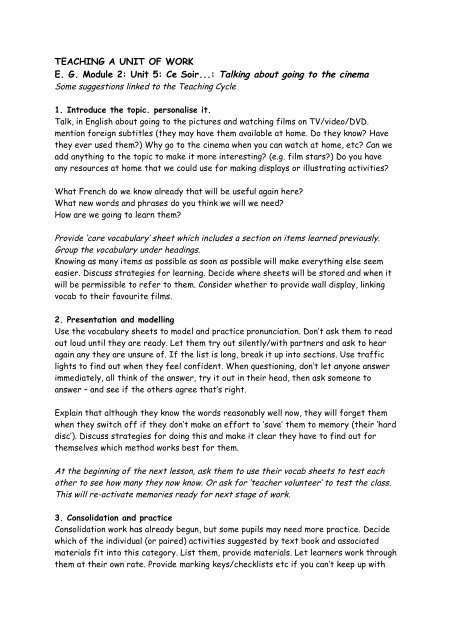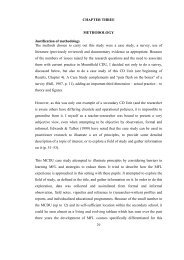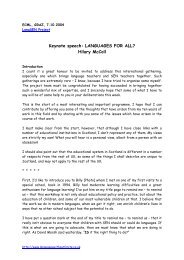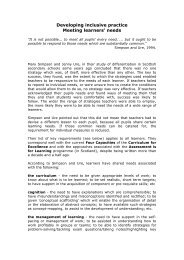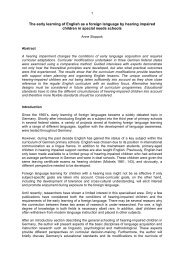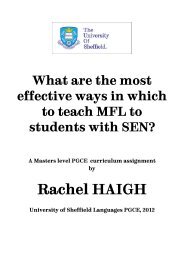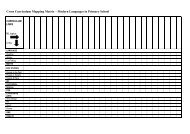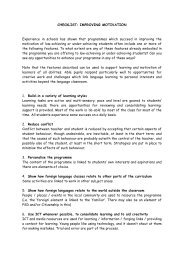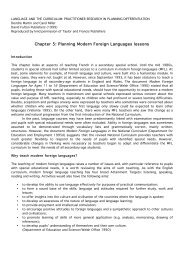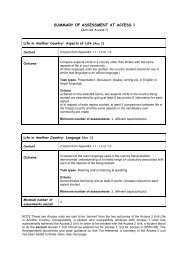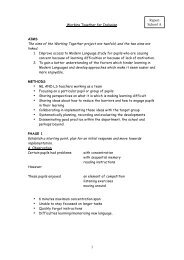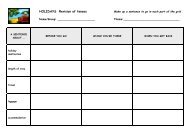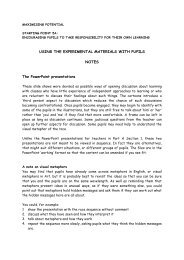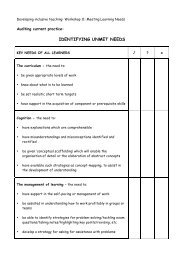TEACHING A UNIT OF WORK E. G. Module 2: Unit 5: Ce Soir ...
TEACHING A UNIT OF WORK E. G. Module 2: Unit 5: Ce Soir ...
TEACHING A UNIT OF WORK E. G. Module 2: Unit 5: Ce Soir ...
You also want an ePaper? Increase the reach of your titles
YUMPU automatically turns print PDFs into web optimized ePapers that Google loves.
<strong>TEACHING</strong> A <strong>UNIT</strong> <strong>OF</strong> <strong>WORK</strong><br />
E. G. <strong>Module</strong> 2: <strong>Unit</strong> 5: <strong>Ce</strong> <strong>Soir</strong>...: Talking about going to the cinema<br />
Some suggestions linked to the Teaching Cycle<br />
1. Introduce the topic. personalise it.<br />
Talk, in English about going to the pictures and watching films on TV/video/DVD.<br />
mention foreign subtitles (they may have them available at home. Do they know? Have<br />
they ever used them?) Why go to the cinema when you can watch at home, etc? Can we<br />
add anything to the topic to make it more interesting? (e.g. film stars?) Do you have<br />
any resources at home that we could use for making displays or illustrating activities?<br />
What French do we know already that will be useful again here?<br />
What new words and phrases do you think we will we need?<br />
How are we going to learn them?<br />
Provide ‘core vocabulary’ sheet which includes a section on items learned previously.<br />
Group the vocabulary under headings.<br />
Knowing as many items as possible as soon as possible will make everything else seem<br />
easier. Discuss strategies for learning. Decide where sheets will be stored and when it<br />
will be permissible to refer to them. Consider whether to provide wall display, linking<br />
vocab to their favourite films.<br />
2. Presentation and modelling<br />
Use the vocabulary sheets to model and practice pronunciation. Don’t ask them to read<br />
out loud until they are ready. Let them try out silently/with partners and ask to hear<br />
again any they are unsure of. If the list is long, break it up into sections. Use traffic<br />
lights to find out when they feel confident. When questioning, don’t let anyone answer<br />
immediately, all think of the answer, try it out in their head, then ask someone to<br />
answer – and see if the others agree that’s right.<br />
Explain that although they know the words reasonably well now, they will forget them<br />
when they switch off if they don’t make an effort to ‘save’ them to memory (their ‘hard<br />
disc’). Discuss strategies for doing this and make it clear they have to find out for<br />
themselves which method works best for them.<br />
At the beginning of the next lesson, ask them to use their vocab sheets to test each<br />
other to see how many they now know. Or ask for ‘teacher volunteer’ to test the class.<br />
This will re-activate memories ready for next stage of work.<br />
3. Consolidation and practice<br />
Consolidation work has already begun, but some pupils may need more practice. Decide<br />
which of the individual (or paired) activities suggested by text book and associated<br />
materials fit into this category. List them, provide materials. Let learners work through<br />
them at their own rate. Provide marking keys/checklists etc if you can’t keep up with
corrections. If you have lots of activities that fit the bill, mark them ‘quite easy’<br />
‘challenging’, let pupils choose, but discuss their choices with them.<br />
This is also the time to exploit the repetitive potential of games and game-like<br />
activities, so intersperse these with more serious activities, but make sure they are<br />
relevant to the learning goals. Where appropriate, provide checklists, help sheets etc.,<br />
and let groups appoint a ‘verifier’.<br />
Some ICT programmes also fit in well here, if they allow pupils to consolidate<br />
vocabulary in a non-threatening environment. Try to make sure that the software<br />
doesn’t introduce too many new words; customisable suites of programmes may be best<br />
for this purpose.<br />
4. Encountering and using real language<br />
a) Select the reading and listening activities which are most relevant to the topic and<br />
most fun to do. Allow own pace and selection where possible. If necessary, reserve one<br />
of each of the activities for assessment. but don’t make every activity a test.<br />
Activities should include a choice of individual, paired and group work. Where possible,<br />
make use of ICT resources to enhance genuine cultural input.<br />
Before this stage of work starts, remind pupils that the speaking and writing they will<br />
be doing next will require them to make use of what they have already learned, but<br />
that they should be looking and listening out for useful phrases to use themselves.<br />
These can be added to the vocabulary sheet. You may want to suggest that they check<br />
these new items with you.<br />
b) Select the most suitable speaking and writing activities from your stock and/or<br />
invent some new ones. For the benefit of able pupils, some of the activities should be<br />
‘open-ended’ and make use of materials and ideas they have contributed themselves. try<br />
to have scope for creative use of language and the opportunity to produce a piece of<br />
work that can be displayed or demonstrated.<br />
Exploit any ICT resources you have access to which allow communication with speakers<br />
of the target language or which allow pupils to compose their own presentations.<br />
5. Debriefing<br />
If necessary, carry out summative assessment as part of the debriefing process so<br />
that pupils are encouraged to reflect on how well they have learned. what went well,<br />
what could be improved, etc. Any ideas for this topic next time round?<br />
WT Project 2005


